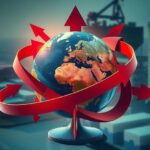Economy
Politics
APPLE, ARGENTINA, ASIA, BLACKBERRY, BRAZIL, CHINA, CRISTINA FERNANDEZ DE KIRCHNER, CRISTINA FERNÁNDEZ DE KIRCHNER, ECONOMICS, ECONOMY, EXCHANGE RATE, JAVIER MILEI, KI, KIRCHNER, MEXICO, NATIONAL PUBLIC RADIO, NATIONAL SECURITY, NESTOR KIRCHNER, NEW YORK TIMES, NORTH AMERICA, SOUTH AMERICA, TIERRA DEL FUEGO, TRADE RELATIONS, TRUMP, UNITED STATES, WORLD BANK
Omar El-Sharif
Lessons from Argentina’s Protectionist Policies: A Warning for America
This article examines Argentina’s historical protectionist policies under President Cristina Kirchner and their negative consequences on the economy, contrasting this with current U.S. tariff strategies. It highlights the detrimental effects of insulation from international trade, urging the U.S. to learn from Argentina’s mistakes to avoid similar pitfalls in industrial competitiveness.
Argentina is frequently cited as a cautionary tale for economic management, particularly in the context of protectionist measures. Between 2007 and 2015, President Cristina Fernández de Kirchner sought to insulate Argentina from global trade by promoting domestic manufacturing. This approach, however, resulted in an industrial landscape characterized by costly and unwanted products that failed to meet consumer needs.
As President Javier Milei begins to dismantle these failed policies, the United States is considering new trade barriers. While President Trump’s tariffs might serve as a negotiating tactic to decrease foreign trade restrictions, persistent tariffs could ultimately lead the American manufacturing sector to resemble the historically ineffective factories of Argentina.
Argentina’s protectionist strategies can be traced back to the Great Depression, escalating during Kirchner’s presidency through high tariffs and licensing requirements for importers. These measures aimed to stimulate domestic manufacturing. A World Bank report in 2012 labeled Argentina as the “world’s most protectionist country,” despite claims that tariffs had facilitated a significant economic revival through infrastructure development funded by tariff revenues.
In reality, Kirchner’s trade barriers provoked discontent among numerous nations, resulting in retaliatory actions against Argentinian exports. She transformed a trade surplus into a deficit by the end of her administration. Notably, her attempts to shield domestic industries backfired, preventing the hoped-for resurgence in manufacturing productivity.
In 2011, Kirchner enforced prohibitive import regulations on electronics, which resulted in the withdrawal of major brands like Apple from the market, while BlackBerry established a production facility in Argentina that eventually became nonviable due to competition from cheaper imports. The irony of the vice president using an iPhone while promoting domestic industry underscored the failures of protectionism.
Kirchner’s administration mandated that foreign firms match export values with local imports to access the Argentinian market. This led companies to engage in agricultural imports, artificially inflating car prices and causing extensive inefficiencies in domestic production. As local industries lost their competitiveness and faced reduced access to essential components, manufacturing capabilities deteriorated further, stifling innovation and production.
Ultimately, economic isolationism proved to be detrimental. With the easing of protectionist measures under President Milei, Argentina experienced a significant increase in imports of capital goods, which paralleled a dramatic rise in exports, achieving a record trade surplus in his first year.
The American economy similarly relies on international trade for its success, with a significant percentage of imports consisting of essential intermediate and capital goods. Isolating American industries from global suppliers may lead to long-term weakening. While tariffs can provide temporary leverage against trading partners, excessive protectionism can hinder competitiveness, as evidenced by Argentina’s experience.
In conclusion, Argentina’s experience serves as an instructive lesson on the perils of protectionism and economic isolationism. The failed policies of former President Kirchner led to inefficiencies and reduced competitiveness within domestic industries. President Milei’s shift towards dismantling these barriers has resulted in a surge in trade and economic performance. The United States must heed this warning, recognizing that excessive tariffs could ultimately hinder its own industrial strength, rather than bolster it.
Original Source: www.city-journal.org







Post Comment